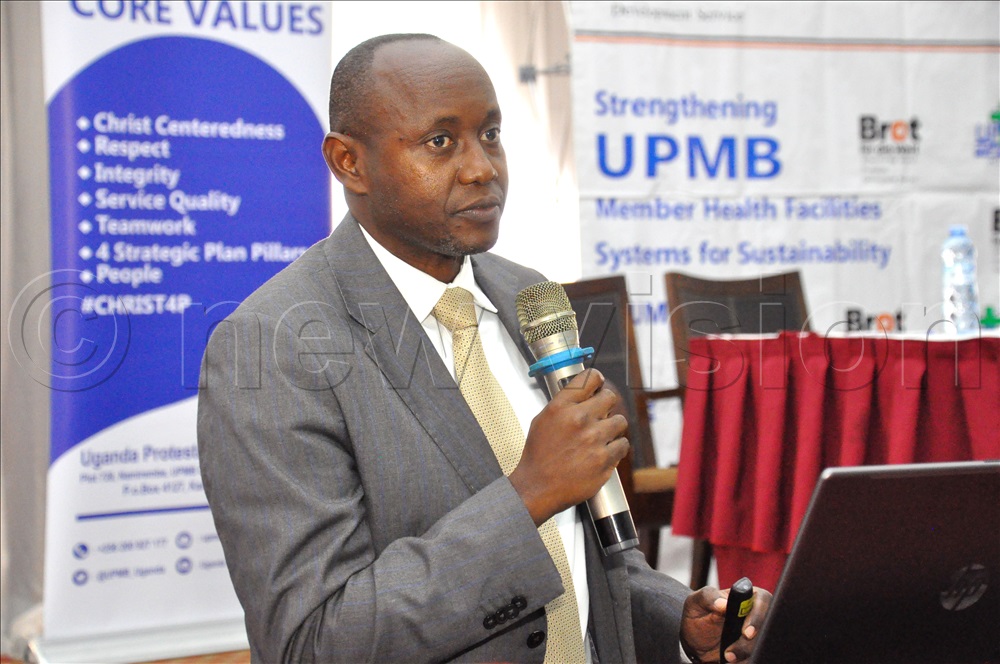'Lifestyle changes will mitigate growing NCD burden'
According to Komakech, NCDs, including hypertension, diabetes, cancer and sickle cell disease, account for approximately 30% of all deaths in Uganda.
Denis Komakech from the Ministry of health addressing participants during the Uganda Protestant Medical Bureau annual symposium at Imperial Royale Hotel on December 5, 2024. (Photos by Nancy Nanyonga)

NewVision Reporter
@NewVision
The health ministry has raised a red flag over what it is calling the escalating burden of non-communicable diseases (NCDs) in Uganda, calling for urgent action to prevent and manage them effectively.
Dr Dennis Komakech, a programmes manager at the ministry, highlighted the severity of the problem during the annual symposium of the Uganda Protestant Medical Bureau (UPMB) on December 5, 2024, at Imperial Royale Hotel.
He, therefore, emphasized the need for a comprehensive approach.
According to Komakech, NCDs, including hypertension, diabetes, cancer and sickle cell disease, account for approximately 30% of all deaths in Uganda.
He noted that these conditions, which are not contagious, are largely influenced by genetics, lifestyle choices, and environmental factors.
Komakech cited smoking, harmful alcohol consumption, physical inactivity and unhealthy diets as the leading modifiable risk factors contributing to the prevalence of NCDs in the country.
“High salt intake, low consumption of fruits and vegetables, and lack of physical exercise are among the practices exacerbating the problem,” Komakech said.
He warned that one in four Ugandans is either overweight or obese, further increasing their susceptibility to chronic illnesses such as hypertension and diabetes, which are already alarmingly prevalent.
Inadequate resources
Komakech lamented the inadequacy of resources to address these challenges, pointing out that less than 5% of NCD medicines are funded by the Government.
Tom Tumwesigye, the executive director of UPMB addressing participants during the Uganda Protestant Medical Bureau annual symposium at Imperial Royale Hotel on December 5, 2024. 
As a result, many patients are forced to bear the high costs of treatment, a burden that places significant strain on their finances and the health system.
He stressed the importance of integrating NCD prevention and management into Uganda’s healthcare framework to improve health outcomes and reduce associated economic losses.
“To combat NCDs effectively, we need to prioritise early detection, comprehensive care, and intersectoral collaboration,” he said.
Komakech underscored the role of community engagement in tackling these diseases, noting that 75% of NCD cases are managed within communities rather than health facilities.
He also highlighted Rwanda as a regional success story in addressing NCDs, commending its strong leadership, robust healthcare systems, and emphasis on task-shifting to empower nurses and other health workers to manage chronic diseases.
He called for similar approaches in Uganda, including increased funding, capacity building, and public awareness campaigns to mitigate the impact of NCDs.
“By investing in healthcare infrastructure, human resources, and community-centred programmes, Uganda can build a more resilient response to the growing NCD crisis,” he concluded.
The symposium, which brought together health experts and policymakers, explored strategies for tackling the burden of NCDs in Uganda and improving the health outcomes of its population.
Tom Tumwesigye, the executive director of UPMB, he highlighted the importance of delivering patient-centered care within existing programmes.
He emphasized that HIV care provides a strong example, where additional services like non-communicable disease management, tuberculosis treatment, and malaria care can be incorporated to ensure comprehensive support for patients.
By addressing multiple health needs in a single visit, Tumwesigye noted, health facilities can provide more holistic and effective care rather than focusing narrowly on specific conditions.
"When a patient comes to a health facility, they are dealt with as a patient and not based on the area that they have," he stated.
Need to integrate health care systems
Sarah Byakika, the commissioner for planning, financing, and policy at the ministry, emphasized the critical need for an integrated healthcare system to enhance efficiency and resource utilization.
She noted that integrating healthcare services across various programmes could address issues of inequity and inefficiency, ultimately improving access to quality care.
"Integration allows us to utilise resources more efficiently, ensuring that services are provided equitably and that we achieve better health outcomes," she explained.
Byakika also highlighted the importance of aligning financing models with integrated frameworks, referencing examples from other countries like Ghana and Rwanda, which have successfully implemented coordinated healthcare financing systems.
She stressed the need for a clear integration framework and collaboration with key stakeholders, including sector partners.
"We must engage all stakeholders to ensure that integration becomes a reality," she said, adding that resource mobilisation and prioritisation are essential for equitable access to healthcare services.
Byakika underscored the significance of learning from best practices in other countries to enhance planning and implementation: "Efficiency and equity must remain central to our approach as we strengthen partnerships and build a sustainable healthcare system".
The numbers
The World Health Organisation (WHO) reports that Noncommunicable diseases (NCDs), including heart disease, stroke, cancer, diabetes and chronic lung disease, are collectively responsible for 74% of all deaths worldwide.
More than three-quarters of all NCD deaths, and 86% of the 17 million people who died prematurely, or before reaching 70 years of age, occur in low- and middle-income countries.
NCDs share five major risk factors: tobacco use, physical inactivity, the harmful use of alcohol, unhealthy diets and air pollution.
The epidemic of NCDs poses devastating health consequences for individuals, families and communities, and threatens to overwhelm health systems. According to WHO, the socioeconomic costs associated with NCDs make the prevention and control of these diseases a major development imperative for the 21st century.